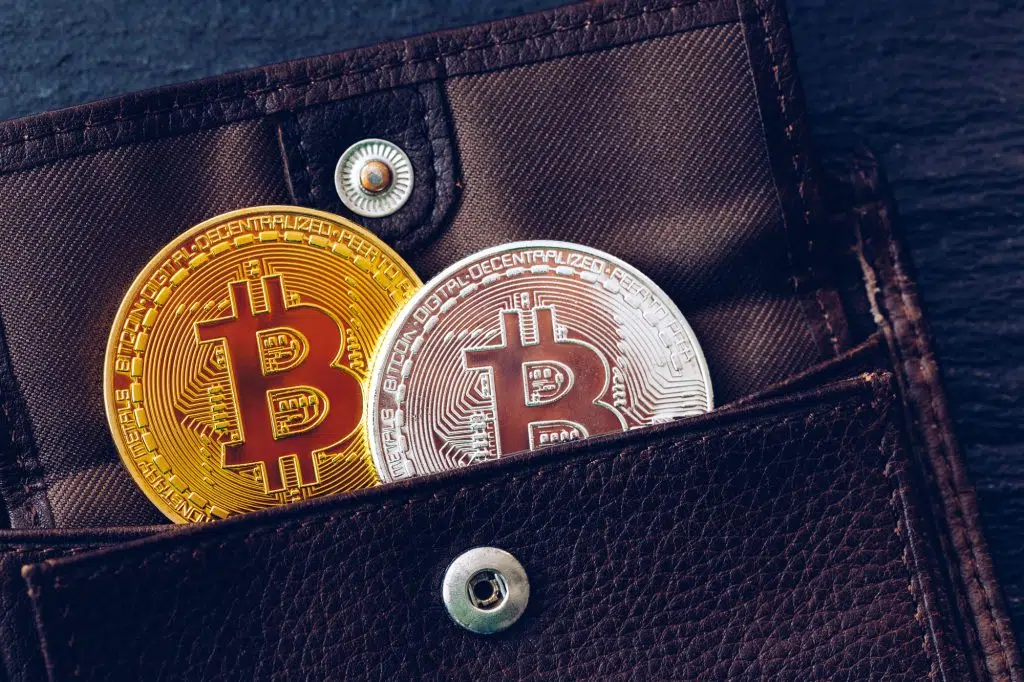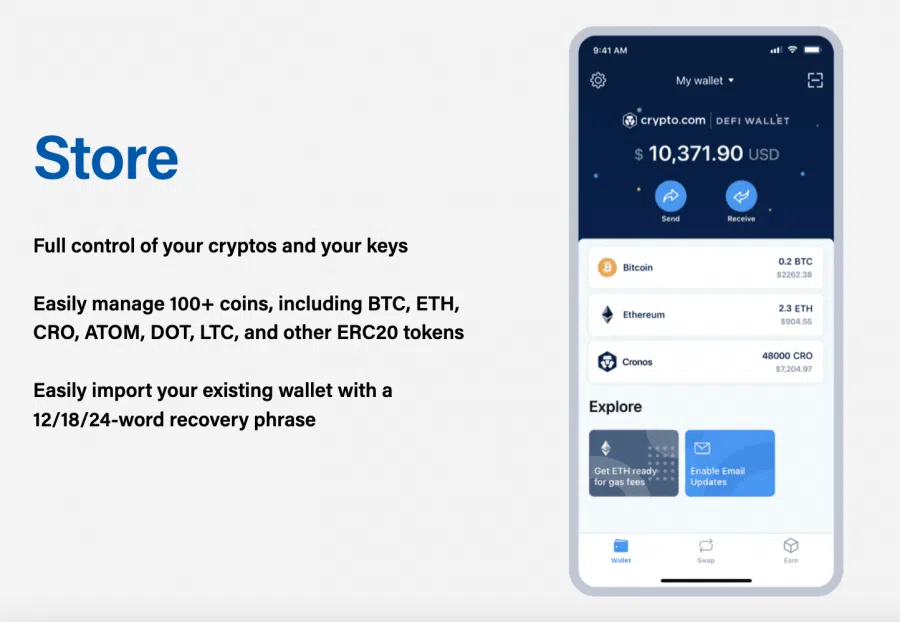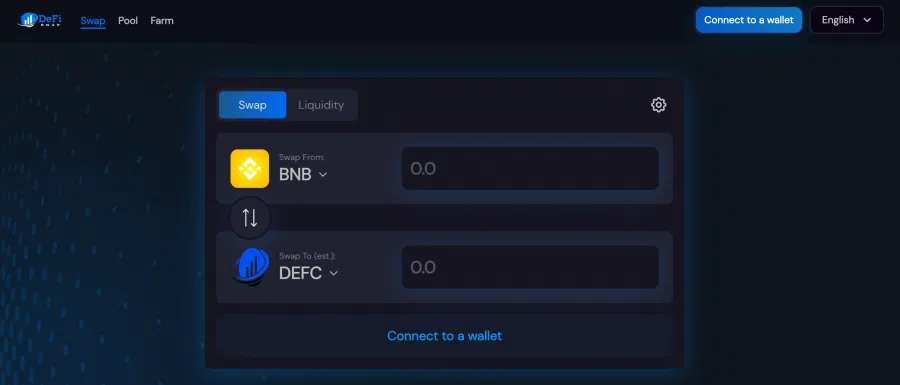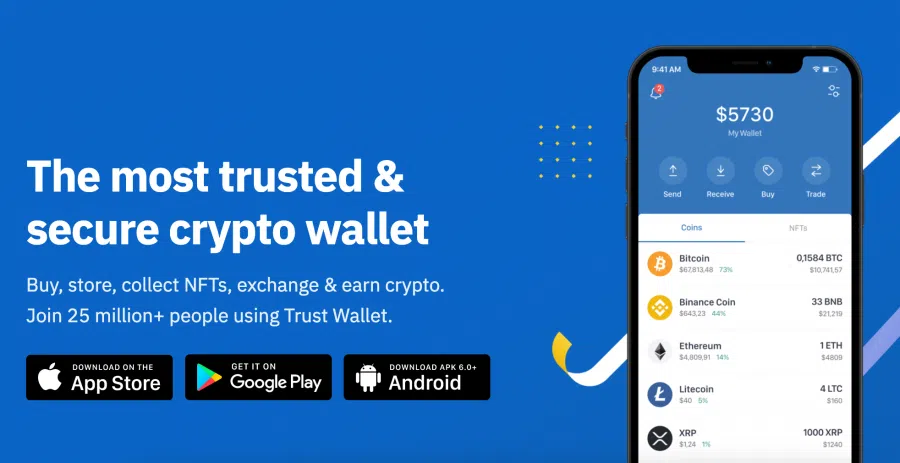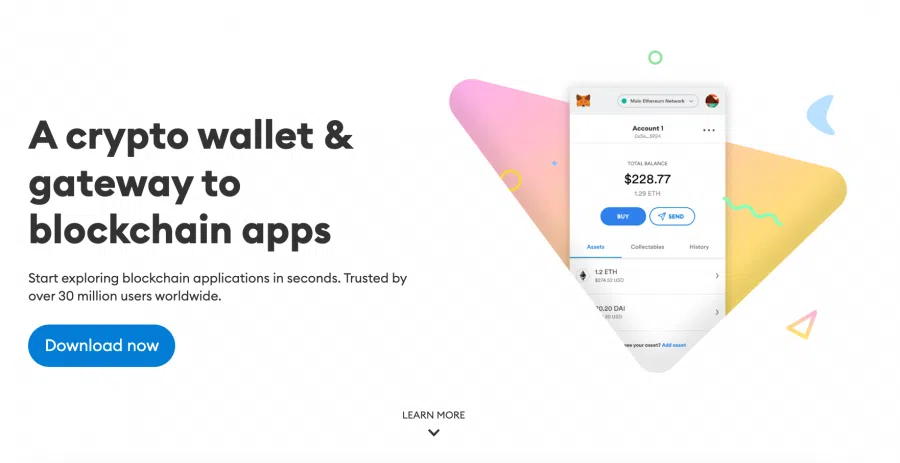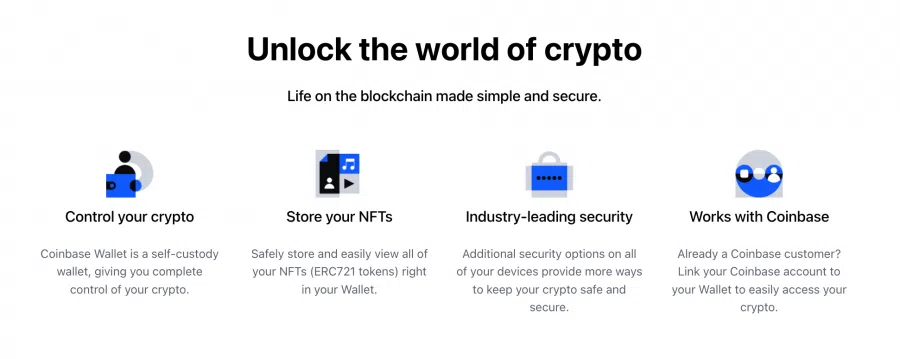Contents
Decentralized finance (DeFi) has swept the crypto industry in recent years, providing a mechanism for market players to conduct services without using a centralized intermediary. DeFi wallets are an important tool in this expanding market, allowing investors to keep their assets safely and easily.
Decentralized finance (DeFi) allows investors to invest in unique and diversified markets such as non-fungible token art and exotic derivatives. To play the game, though, you’ll need a non-custodial DeFi wallet.
Non-custodial DeFi wallets take the place of Web2 platform login windows that let you to login into a new site using your Facebook or Google account. Web3 wallets are compatible with all main DeFi protocols and, to a limited extent, with blockchains.
This article will go through the best DeFi wallets on the market, explaining what they are and how they function then show you how to get going with a top DeFi wallet provider.
The brand new newsletter with insights, market analysis and daily opportunities.
Let’s grow together!
What is a DeFi wallet?
A DeFi wallet is a non-custodial wallet where your cryptocurrency assets are stored. They are non-custodial, which means that only those who have the seed phrase or secret key (comparable to a password) may access your money. Governments never freeze the account, but they may compel a token issuer to suspend assets supplied to exchanges or deem some assets outdated.
Non-custodial wallets differ from centralized exchange wallets. You give up control of your assets there. The primary distinction between a bank and a crypto market is that deposits to the former are frequently regulated and protected by government deposit programs. Mt. Gox, Quadriga CX, and Einstein Exchange, for example, have all lost client assets and left victims unable to recover their funds.
Non-custodial crypto wallets are roughly classified into two types: hardware wallets and software wallets. Companies like Ledger and Trezor make the former. They resemble USB sticks (thumb drives) and are purchased to save your cash offline (also known as “cold storage”).
Software wallets are digital wallets accessed via a web browser or a mobile device. They’re typically free.
How do DeFi Wallets Work?
Whether you want a DeFi wallet for iOS and Android or just want to keep your holdings in a browser-based wallet, it’s important to understand how these platforms function. As previously said, DeFi wallets are fundamentally ‘non-custodial,’ meaning only you can access your secret key.
According to Gemini, the private key serves as evidence of ownership and lets you spend the cash stored in the wallet. Private keys can take several forms, but the most common are lengthy binary codes, hexadecimal codes, or QR codes. Most wallets include a seed phrase’ that encodes your private key as a backup, so you may not have to manage it manually.
Since your bitcoin holdings are maintained on the blockchain instead of within a DeFi wallet, encryption keys are vital to displaying ownership of those holdings. In summary, DeFi wallets protect your private key rather than your cryptocurrency. If you lose your private key and exhaust all recovery attempts, the crypto assets associated with that key would most likely be irrevocably gone.
Types of DeFi Wallet Accounts
There are several crypto wallet formats available for consumers to select from, just as there are various wallets that can be used to store and carry cards and cash. The sort of cryptocurrency wallet you should use is determined by your particular preferences. There’s a wallet for everyone, whether you’re new to crypto and want to set up your first wallet or you’re becoming serious about crypto investment and need greater protection.
- Online wallet/ Hot Wallet
Exchange wallets are a popular form of wallet best suited for inexperienced investors. When you sign up for a crypto exchange such as Crypto.com, Binance, or any popular platform, you typically create an exchange wallet. You may use this wallet to deposit your bank account funds and then use it to buy bitcoin on the exchange, which is then saved in your exchange wallet.
Because it employs hot storage, its security protections are minimal compared to more complex choices such as hardware wallets. This is because exchange wallets are vulnerable to the cybersecurity of the platform on which they are housed. However, for newbies, this form of crypto wallet is frequently the easiest to set up and access.
- Hardware wallet/ Cold Wallet
Hardware wallets, like those made by Trezor and Ledger, are hardware devices that use cold storage to store your cryptocurrency’s private keys. They are a custodial wallet and are best suited for intermediate to experienced crypto investors, while novices may benefit from them as well.
They may resemble small portable devices or ordinary flash drives, but they are protected by a PIN required to access the contents, in addition to an optional passcode. However, the PIN and passcode aren’t the only safeguards for these wallets. If a skilled hacker gained access to a hardware wallet, they also would require the seed phrase to have access to your bitcoin. Because your seed word is only known to you, the hacker would be exceedingly unlikely to guess or hack it.
- Software wallet
In that they usually employ hot storage, software wallets are comparable to exchange wallets. They are not, however, hosted by an exchange and are non-custodial. To trade on an exchange with your software wallet, you must first link it to the marketplace of your choice.
While every digital/exchange wallet is a software wallet, not every software wallet is an exchange wallet. Instead, software wallets might be housed on a mobile app or desktop that is not linked to an exchange. MetaMask, Electrum, and Exodus are a few examples. Some of them even provide cryptocurrency trading.
The Best DeFi Wallets
Although decentralized and centralized wallets have advantages and disadvantages, more and more individuals gravitate toward the former owing to their numerous benefits. Let’s take a look at the finest DeFi wallets on the market at the moment now:
- Crypto.com DeFi Wallet
Crypto.com DeFi wallet is a good alternative. This wallet is supplied by Crypto.com, one of the finest crypto exchanges in terms of costs and asset availability. The Crypto.com DeFi wallet is a non-custodial wallet that is free to download from Google Play or the App Store.
The Crypto.com wallet, as a non-custodial wallet, gives you total control over your assets and private key. Over 100 crypto-assets are supported by the wallet, including many of the finest cryptocurrencies and DeFi tokens. When sending any of these valuables to another wallet, Crypto.com lets you select the speed you want to use, allowing you to save funds on network costs.
The Crypto.com DeFi wallet also includes a ‘DeFi Earn’ function that lets you to earn interest on over 35 supported coins. In addition, according to the Crypto.com DeFi wallet review, you may supply liquidity to the marketplace and gain a portion of the token swap fees. Finally, when it comes to Crypto.com DeFi wallet taxation, you may integrate with the wallet and improve your tax reporting by using the ‘Crypto.com Tax’ service.
- DeFi Swap
DeFi Swap is now a decentralized marketplace (DEX) that lets users exchange tokens and earn interest payments without a centralized intermediary. The exchange does this using a user-friendly browser-based interface, with no KYC checks required.
Although DeFi Swap is not a typical DeFi wallet, it does provide many of the same functions as regular wallets. DeFi Swap supports over 50 currencies, including the platform’s native ‘DeFi Coin’ token, making token switching one of the most popular services.
We also highlighted throughout this DeFi wallet review that users could engage in DeFi Swap’s yield farming method, which has four distinct tiers. Each tier has a distinct lock-up duration and APY, with the platinum tier delivering up to 75% of annual income. You may earn a percentage of the commissions made on the DeFi Swap network by becoming a liquidity provider and depositing your tokens in any of the liquidity pools.
- Trust Wallet
Trust Wallet is a mobile wallet used by roughly 25 million individuals globally and supports over 7 million crypto-assets. Trust Wallet supports 69 blockchains, making it one of the top DeFi wallets for asset choices.
The finest feature of Trust Wallet is its ‘Trust dApp Browser,’ a fully functional Web 3.0 search engine that allows you to use a wide range of decentralized apps (dApps). Ethereum and Binance Smart Chain (BSC) dApps are allowed by this browser, meaning that you may employ protocols including PancakeSwap, 1inch, OpenSea, and more. Trust Wallet, in addition to the dApp browser, supports smooth token switching and even lets you buy cryptocurrency with a debit or credit card. Trust Wallet has a staking feature that supports 12 major coins. APYs vary greatly. However, several supported coins provide more than 10% each year. Finally, the Trust Wallet supports NFTs, enabling you to make your transaction on one of the leading NFT markets and then safely keep your assets over time.
- MetaMask
MetaMask is an excellent DeFi wallet for iOS and Android. Investors who buy bitcoin daily are likely to be familiar with MetaMask, which has over 30 million active users each month. The wallet fully supports the platform and may be downloaded as a mobile app or browser extension.
One of MetaMask’s biggest features is that it collects data from many sources, guaranteeing you receive the best pricing with the lowest network costs when transferring tokens. MetaMask also distributes your orders across various exchanges, preventing slippage. This is possible because of collaborations with prominent protocols like Uniswap, Curve, 1inch, and others.
- Coinbase Wallet
Another wallet that offers comparable functionality to DeFi Swap and the CRO DeFi Wallet is the Coinbase Wallet. The Coinbase Wallet boasts a very user-friendly layout with no sophisticated language or features, making it excellent for novices in the area. This wallet supports over 100,000 tokens and can also store NFTs.
If you’re searching for one of the best crypto applications for confidentiality, the Coinbase Wallet is an excellent choice since it provides industry-leading protection while providing total control over your assets and keys. The Coinbase Wallet, like the Trust Wallet, allows you to surf the decentralized web and employ a wide range of dApps for yield generating and NFT investment.
The Top DeFi Wallets Compared
The chart below provides a clear comparison of the eight wallet providers discussed above, providing you have all of the data you require to make an informed wallet selection:
| Wallet
|
Service | Number of coins Supported | Fee structure | Mobile APP |
| Crypto.com Defi wallet
|
Swapping, staking, storing | 100+ | No wallet fees | Yes |
| DeFi Swap
|
Token swapping, staking, yield farming
|
50+ | Variable (paid in BNB) | Currently in development |
| Trust Wallet
|
Crypto purchases, token swapping, dApp browser, staking | 1,000,000+ | No wallet fees | Yes |
| MetaMask
|
Token swapping, crypto purchases, dApp browser | 500,000+ | 0.875% service fee per swap | Yes |
| Coinbase Wallet
|
dApp browser, crypto purchases, NFT support, swapping, staking | 100,000+ | No wallet fees (exchange fees do apply) | Yes |
How to Choose the Best DeFi Wallet for You
Choosing a DeFi wallet may be challenging, especially if you are new to the industry. Some of the most crucial variables to consider are listed below to assist in simplifying the decision-making process:
- Level of Security
The wallet’s security level should be your priority since it is essential to keep your encryption key safe. Although hardware wallets provide the maximum degree of protection, several ‘hot’ wallets also have leading security standards owing to their offline nature. Biometric authentication, two-factor verification, standardized protocols, and other methods may be used.
- Services Provided
Many DeFi wallets function as a ‘crypto bank,’ allowing you to keep your assets securely. The finest DeFi wallets, on the other hand, have extra functionality like token trading, yield farming, staking, and more. Some wallets even have a ‘dApp browser,’ allowing you to browse the decentralized web.
- Assets that are supported
The assets supported by a DeFi wallet are determined by the blockchain with which it is compatible. If a wallet connects to the Ethereum network, it will likely handle most ERC-20 and ERC-721 tokens. However, some wallets enable several chains, allowing them to function with an infinite amount of tokens.
- Fees
When linking your DeFi wallet to your bank account, you should look into the wallet’s costs. Many wallets allow you to buy cryptocurrency directly from the platform’s interface, whether by credit/debit card or bank transfer. There is normally a cost connected with this, as well as network fees that accumulate when a token is moved — but these are determined by the individual blockchain rather than the wallet provider.
- Accessibility
The wallet’s accessibility must also be taken into account. This relates to how quickly you can access your assets, with hot wallets being the most accessible. Platforms like DeFi Swap may be accessed via your web browser, rendering them the most convenient for exchanges and staking.
Conclusion
It is just as vital to select the finest crypto wallet to securely save your assets as it is to select the best location to store your funds and data securely. While novices can begin with a basic digital or exchange wallet, professional traders can gain more protection for large-volume trades and cash by using cold storage and hardware wallets. Consider the many features and benefits of each type of wallet before deciding which one best suits your cryptocurrency trading and investment habits.



